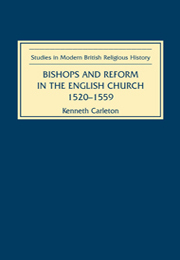Book contents
- Frontmatter
- Contents
- List of Illustrations
- Dedication
- List of Abbreviations
- Acknowledgements
- Introduction
- 1 Theologies of Episcopacy in mid-Tudor England
- 2 Models of Episcopal Office
- 3 Bishops of the English Church, 1520–1559
- 4 The Bishop and Preaching
- 5 Bishops and the Provision of Education
- 6 Prayer and Sacrifice: the Life of the Bishop
- 7 Episcopal Activity I: the Eradication of Heresy
- 8 Episcopal Activity II: the Propagation of the Ministry
- 9 Conclusion: the Old Episcopate in a New Order
- Appendix I Prosopography of the bishops in office, 1520–1559
- Appendix II The dioceses
- Appendix III The education of the bishops
- Appendix IV The bishops of Sodor and Man
- Bibliography
- Index of Scriptural References
- General Index
6 - Prayer and Sacrifice: the Life of the Bishop
Published online by Cambridge University Press: 12 September 2012
- Frontmatter
- Contents
- List of Illustrations
- Dedication
- List of Abbreviations
- Acknowledgements
- Introduction
- 1 Theologies of Episcopacy in mid-Tudor England
- 2 Models of Episcopal Office
- 3 Bishops of the English Church, 1520–1559
- 4 The Bishop and Preaching
- 5 Bishops and the Provision of Education
- 6 Prayer and Sacrifice: the Life of the Bishop
- 7 Episcopal Activity I: the Eradication of Heresy
- 8 Episcopal Activity II: the Propagation of the Ministry
- 9 Conclusion: the Old Episcopate in a New Order
- Appendix I Prosopography of the bishops in office, 1520–1559
- Appendix II The dioceses
- Appendix III The education of the bishops
- Appendix IV The bishops of Sodor and Man
- Bibliography
- Index of Scriptural References
- General Index
Summary
By the end of the Middle Ages it was generally accepted that the holding of episcopal office included the obligation to exercise hospitality. Three scriptural texts, 1 Timothy 3:5, Romans 12:13 and Hebrews 13:2, informed much late medieval thinking on this requirement. Paul's first letter to Timothy was used in the sixteenth century on both sides of the Reformation divide to support conflicting models of episcopal office, the specific verse mentioned being applied to the debate over clerical celibacy. If a bishop could not demonstrate his ability to govern his household, how could he be able to govern the Church? Those who sought to allow the clergy to marry argued from this text that marriage, rather than celibacy, was required of the clergy. The transition from a celibate (if not always chaste) clergy to a married one had implications for both the financial and the social status of the bishop. At the same time, traditional episcopal revenues were coming under considerable pressure from a Crown anxious both to reward loyal service and to exercise the control afforded by the newly defined Royal Supremacy over the Church.
The keeping of hospitality was doubly incumbent upon the late medieval bishop. As one of the Lords Spiritual, the temporal baronetcy annexed to his see carried with it the same obligations as to household and retinue as those demanded of the Lords Temporal. Furthermore, as successor to the Apostles and (in his diocese) chief pastor, the bishop had a spiritual duty to care for the needs of his flock, especially the most vulnerable among them.
- Type
- Chapter
- Information
- Bishops and Reform in the English Church, 1520–1559 , pp. 117 - 131Publisher: Boydell & BrewerPrint publication year: 2001



